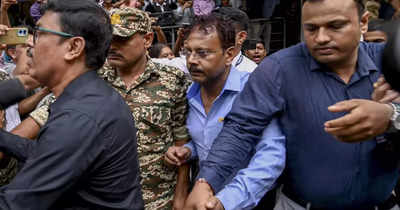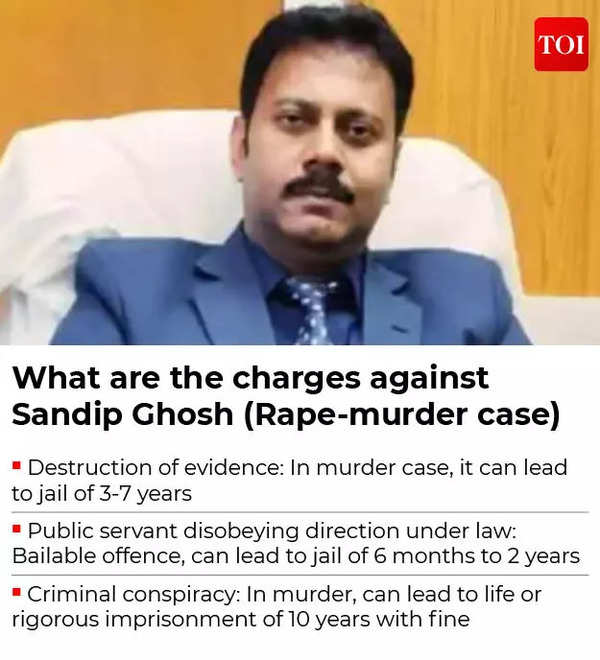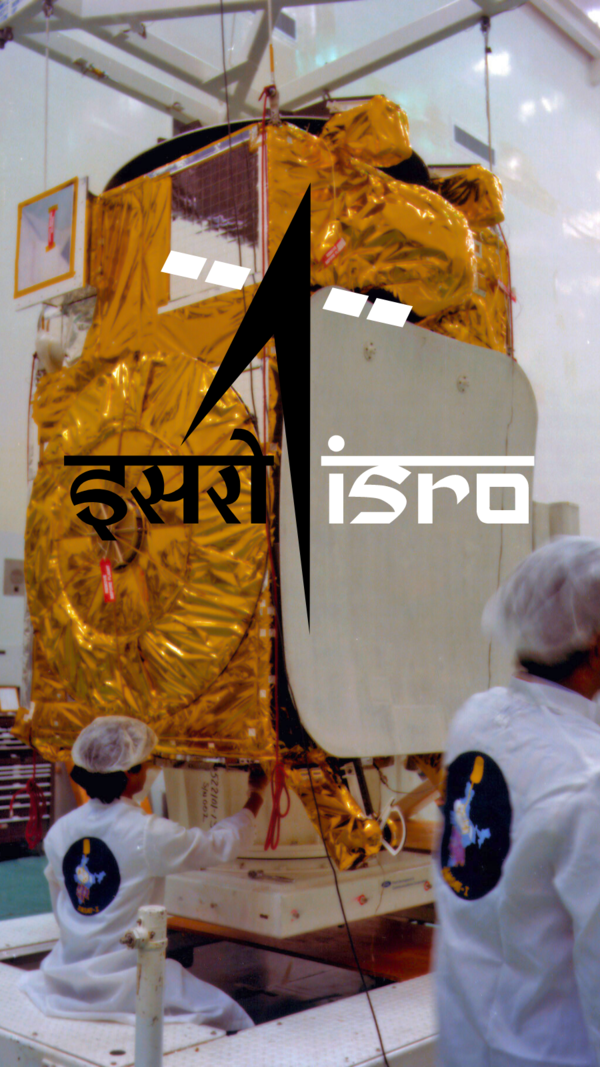- News
- Education News
- News
- Should Ex RG Kar principal Sandip Ghosh's medical registration be cancelled? Here's what WBMC rules say
Trending
Should Ex RG Kar principal Sandip Ghosh's medical registration be cancelled? Here's what WBMC rules say
The Indian Medical Association's Bengal State Branch has requested the West Bengal Medical Council to cancel Dr Sandip Ghosh's registration due to his involvement in severe criminal activities like rape and murder. Despite receiving a show-cause notice in September 2024, Ghosh did not respond, leading to increased demands for regulatory action.

Ex-RG Kar Principal Sandip Ghosh
NEW DELHI: The recent appeal by the Indian Medical Association's (IMA) Bengal State Branch to cancel the medical registration of Dr Sandip Ghosh, former principal of RG Kar Medical College, has brought the spotlight on the West Bengal Medical Council (WBMC) and its regulatory powers. In a formal letter addressed to Dr Sudipto Roy, President of the WBMC, the IMA expressed concern over the council's delay in revoking Dr Ghosh's registration despite his failure to respond to a show-cause notice issued earlier in September 2024.
The appeal follows Ghosh’s involvement in serious criminal proceedings and his arrest by the Central Bureau of Investigation (CBI) on charges related to the rape and murder of a postgraduate doctor at RG Kar Medical College, along with corruption allegations during his tenure as principal.
Arrest of Dr Sandip Ghosh and CBI Charges

Earlier in September, Ghosh had also been taken into judicial custody over separate corruption charges related to financial mismanagement during his tenure at RG Kar Medical College. The Enforcement Directorate (ED) is investigating the money laundering aspect of these financial irregularities. The CBI's additional charges of misleading the investigation and the alleged role in covering up the victim's death have intensified the call for disciplinary action by the WBMC.
IMA's Appeal to the WBMC: Legal Implications
The IMA's Bengal State Branch has taken a strong stance, pressing the WBMC to immediately cancel Dr Ghosh's medical registration. According to their appeal, Dr Ghosh was given ample opportunity to respond to the show-cause notice from the council, yet he failed to do so. As per the IMA’s letter, the medical community is now demanding an explanation as to why the WBMC has not yet taken definitive action to revoke Ghosh’s registration despite the gravity of the charges against him.
This raises the question - can the West Bengal Medical Council actually cancel Dr Ghosh’s registration based on the charges and his actions? The answer lies in the specific provisions of the WBMC Act.
The West Bengal Medical Council has clearly outlined rules for the cancellation or suspension of a doctor's registration under certain conditions. These rules are designed to protect the integrity of the medical profession and ensure that practitioners adhere to both legal and ethical standards.
According to the WBMC, the council can refuse or cancel the registration of a medical professional if certain criteria are met. One of the most important criteria involves legal convictions. The council has the authority to act in cases where:
Non-bailable Offences: If a registered medical practitioner is sentenced by a court for any non-bailable offence, the council can cancel their registration. This rule applies as long as the conviction has not been overturned by a higher court or quashed, and the individual remains disqualified due to the offence. In Ghosh’s case, with both the CBI and ED investigating serious charges of rape, murder, and corruption, these offences fall squarely within this category.
Infamous Professional Conduct: The WBMC also has the authority to cancel the registration of a medical practitioner found guilty of infamous conduct in any professional respect. This decision can be made after a thorough inquiry, where the doctor is given an opportunity to defend themselves. If two-thirds of the council members present during the inquiry agree, the practitioner’s name can be removed from the register. Dr Ghosh’s alleged involvement in obstructing justice and destruction of evidence could be viewed as falling under this rule if proven.
Due process for cancellation of registration
Before taking such drastic measures, the WBMC follows a procedure to ensure fairness as per the WBMC Act. The council first issues a show-cause notice to the practitioner in question, providing them with an opportunity to explain why their registration should not be cancelled. In Dr Ghosh’s case, this show-cause notice was issued on September 7, 2024, and despite being given three days to respond, he reportedly did not provide any reply. The council could now proceed to deliberate on the cancellation based on his non-compliance with the notice and the serious nature of the allegations.
What happens once the West Bengal Medical Council takes a decision on cencellation?
Once the WBMC decides to cancel a doctor’s registration, the practitioner must surrender their registration certificate to the council. The cancellation is also published in the Official Gazette to ensure transparency and inform the public. However, under the WBMC’s rules, there is also a provision for reinstatement. If, at a later stage, the practitioner’s name is cleared of wrongdoing, their registration can be re-entered into the council’s register, and the reinstatement is also published officially.
The letter further urged the council to uphold constitutional provisions and take action without being influenced by personal relationships.
The appeal follows Ghosh’s involvement in serious criminal proceedings and his arrest by the Central Bureau of Investigation (CBI) on charges related to the rape and murder of a postgraduate doctor at RG Kar Medical College, along with corruption allegations during his tenure as principal.
Arrest of Dr Sandip Ghosh and CBI Charges
Dr Sandip Ghosh was arrested by the CBI on September 15, 2024, in connection with the tragic rape and murder of a postgraduate doctor on the hospital premises in August. In this high-profile case, Ghosh and police officer Abhijit Mondal were accused of obstructing justice by delaying the declaration of the victim’s death and postponing the registration of the FIR (First Information Report). These actions have led to allegations that Ghosh attempted to destroy crucial evidence related to the crime.

Earlier in September, Ghosh had also been taken into judicial custody over separate corruption charges related to financial mismanagement during his tenure at RG Kar Medical College. The Enforcement Directorate (ED) is investigating the money laundering aspect of these financial irregularities. The CBI's additional charges of misleading the investigation and the alleged role in covering up the victim's death have intensified the call for disciplinary action by the WBMC.
IMA's Appeal to the WBMC: Legal Implications
The IMA's Bengal State Branch has taken a strong stance, pressing the WBMC to immediately cancel Dr Ghosh's medical registration. According to their appeal, Dr Ghosh was given ample opportunity to respond to the show-cause notice from the council, yet he failed to do so. As per the IMA’s letter, the medical community is now demanding an explanation as to why the WBMC has not yet taken definitive action to revoke Ghosh’s registration despite the gravity of the charges against him.
This raises the question - can the West Bengal Medical Council actually cancel Dr Ghosh’s registration based on the charges and his actions? The answer lies in the specific provisions of the WBMC Act.
West Bengal Medical Council Rules on Registration Cancellation
The West Bengal Medical Council has clearly outlined rules for the cancellation or suspension of a doctor's registration under certain conditions. These rules are designed to protect the integrity of the medical profession and ensure that practitioners adhere to both legal and ethical standards.
According to the WBMC, the council can refuse or cancel the registration of a medical professional if certain criteria are met. One of the most important criteria involves legal convictions. The council has the authority to act in cases where:
Non-bailable Offences: If a registered medical practitioner is sentenced by a court for any non-bailable offence, the council can cancel their registration. This rule applies as long as the conviction has not been overturned by a higher court or quashed, and the individual remains disqualified due to the offence. In Ghosh’s case, with both the CBI and ED investigating serious charges of rape, murder, and corruption, these offences fall squarely within this category.
Infamous Professional Conduct: The WBMC also has the authority to cancel the registration of a medical practitioner found guilty of infamous conduct in any professional respect. This decision can be made after a thorough inquiry, where the doctor is given an opportunity to defend themselves. If two-thirds of the council members present during the inquiry agree, the practitioner’s name can be removed from the register. Dr Ghosh’s alleged involvement in obstructing justice and destruction of evidence could be viewed as falling under this rule if proven.
Due process for cancellation of registration
Before taking such drastic measures, the WBMC follows a procedure to ensure fairness as per the WBMC Act. The council first issues a show-cause notice to the practitioner in question, providing them with an opportunity to explain why their registration should not be cancelled. In Dr Ghosh’s case, this show-cause notice was issued on September 7, 2024, and despite being given three days to respond, he reportedly did not provide any reply. The council could now proceed to deliberate on the cancellation based on his non-compliance with the notice and the serious nature of the allegations.
What happens once the West Bengal Medical Council takes a decision on cencellation?
Once the WBMC decides to cancel a doctor’s registration, the practitioner must surrender their registration certificate to the council. The cancellation is also published in the Official Gazette to ensure transparency and inform the public. However, under the WBMC’s rules, there is also a provision for reinstatement. If, at a later stage, the practitioner’s name is cleared of wrongdoing, their registration can be re-entered into the council’s register, and the reinstatement is also published officially.
End of Article
FOLLOW US ON SOCIAL MEDIA










